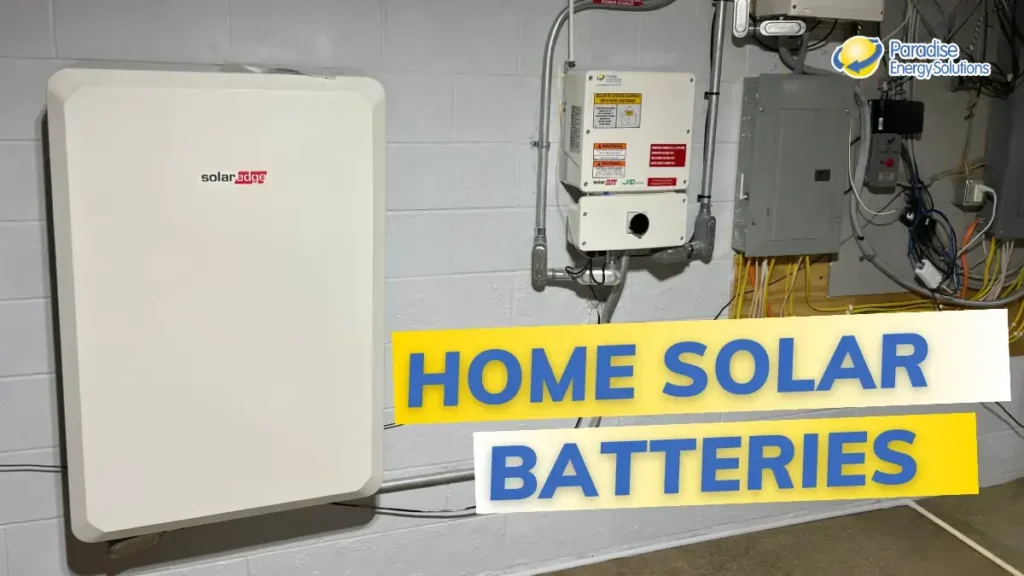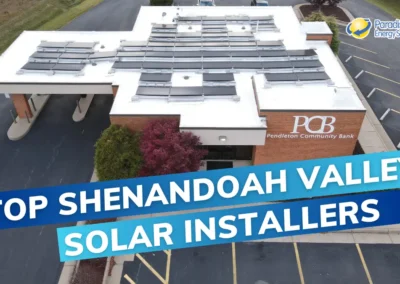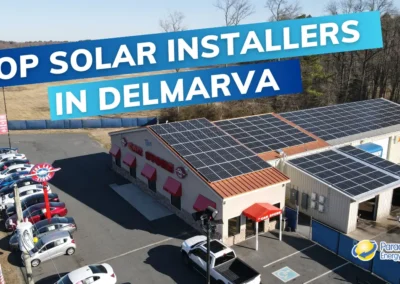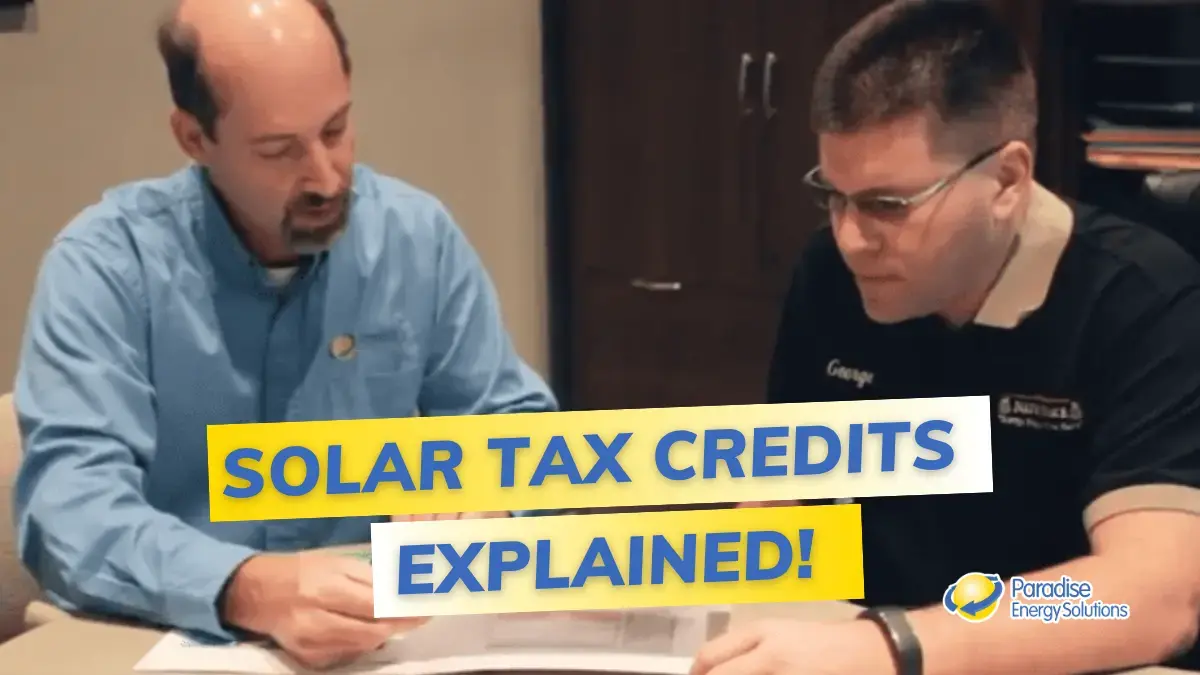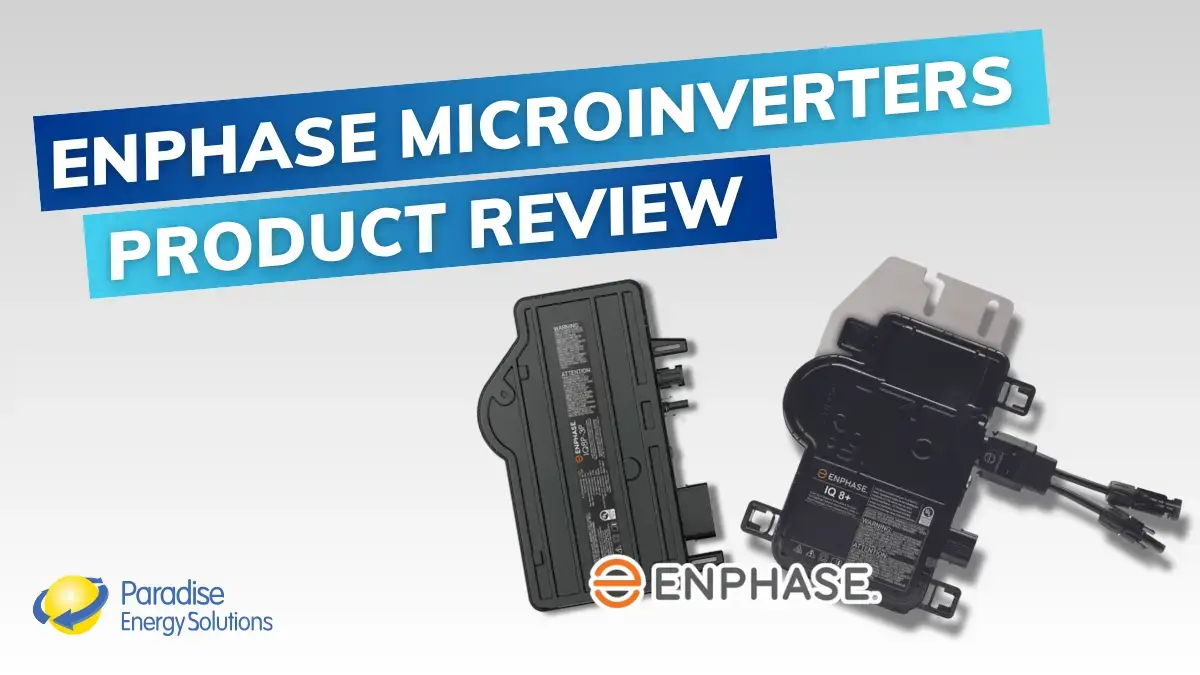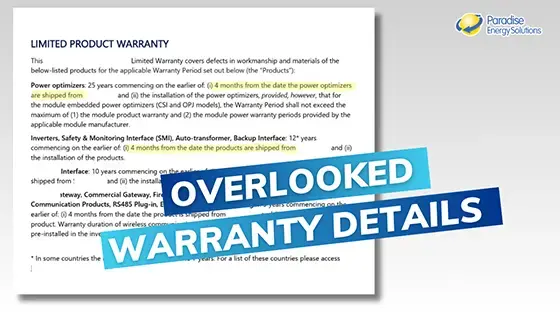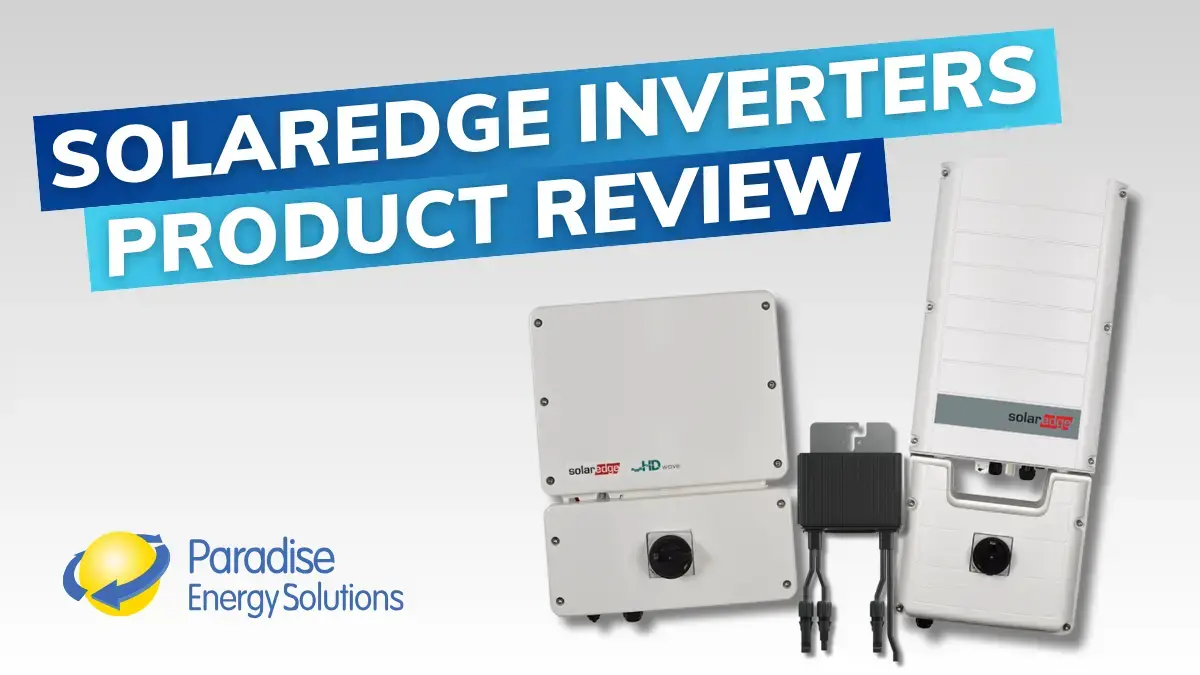Blackouts are no longer rare events. They’re part of life in 2025. Whether it’s a storm-knocked substation or a record-hot day straining the grid, the question isn’t if the power will go out, but how long it will stay down. That reality is why solar battery storage has moved from “nice-to-have” to the fastest-growing upgrade in residential solar systems.
Yet batteries raise big questions. Are they really worth the price tag? How many kilowatt-hours do you need? Can you add storage later without ripping out your inverter? And what about the federal tax credit – does it still apply if you buy batteries alone?
This guide answers all of that in one place. We’ll debunk the most common battery myths, compare grid-tied vs. off-grid setups, break down 2025 cost curves and incentives, walk you through a step-by-step sizing formula, and show where batteries shine and where a generator might still make more sense. By the end, you’ll know exactly how to decide if solar batteries fit your energy goals, your budget, and your peace-of-mind checklist.
Home Solar Battery Common Misconceptions
We’ve noticed two main misconceptions about solar battery backup for homes. Those are:
One or two batteries will backup their entire house and it will only cost a few thousand dollars to do so.
Unfortunately, neither of these is true. Most home battery banks only back up a handful of appliances and devices for a limited amount of time.
While it’s possible to install enough batteries for your entire home, this would be extremely expensive ($100,000 to $200,000 or more, depending on the number of loads).
That said, installing batteries for energy backup can still be a great way to guarantee you’ll have enough power for the essentials.
Grid-Tied vs. Off-Grid
There are two types of solar energy systems: Grid-tied and off-grid solar systems.
Grid-Tied Solar Systems: This is where your home and system are connected to the electricity grid. You still have access to utility-generated electricity.
Off-Grid Solar Systems: With this type, you’re not connected to the electric grid. All power is sourced independently.
How does this relate to batteries? With a grid-tied system, batteries are an optional add-on that fills the gap when the power goes out. When your solar panel system stops generating electricity (like at night), you can pull electricity from the grid. This is the type of system most homes and businesses have.
With an off-grid system, you’ll only be able to use the electricity you generate through a solar system, wind turbine, or generator. In this case, a much larger (and more expensive) battery system is common and supplemented by other power sources, like generators.
Are Solar Batteries Worth It?
There’s no way around it — a solar energy system requires a significant upfront investment, though it can save you a substantial amount of money in the long term. Adding batteries for solar energy storage on top of typical installation costs will increase the price further. So is it worth it to get a solar battery?
Dependable Emergency Energy
Many of us saw the headlines and news stories of the historic grid outages that plagued Texas in the winter of 2021 and thought “what can I do to make sure that never happens to my family?”
Depending on where you live, prolonged power outages aren’t something we typically experience, thus aren’t something most American homes are prepared for. But as harsh winter storms and extremely hot summers strain electricity grids, and severe hurricanes and massive tornadoes create disastrous scenarios, it seems the chances of experiencing a long-term grid outage are increasing. It’s crucial that we consider how we can prepare.
A grid-tied solar system itself won’t be able to power your home when the grid goes down. But with solar-energy-backed batteries, you can tap into the power generated by your system at any time. Batteries can turn your solar system into a reliable power source in prolonged outages.
While others are at the mercy of the utility repairing the damaged or overloaded electricity grid, you can keep the lights on thanks to your stored energy.

Solar Batteries Utilize a Widely Available, Free Fuel Source
Many people depend on a gas-powered generator to get them through a power outage. These can be a good, low-cost option. However, they’re not foolproof.
Because generators depend on a limited fuel source, finding the gas to power your generator in a prolonged power outage can be difficult, if not impossible. Gas pumps need electricity to distribute gas, meaning if their generators stop working, no one can access the fuel for their generators.
Additionally, natural disasters and other emergency situations can cripple infrastructure, making it impossible for fuel deliveries to make it to the affected area in a timely manner.
Solar batteries, however, are not dependent on an in-demand commodity like gas. Solar panels can generate power at nearly any temperature, hot or cold, so long as the sun is shining.
While snow can inhibit electricity production, solar systems are designed to shed snow quickly, as they warm up much more quickly than the ground and are often installed at an angle. This means the snow will melt or slide off the panels much more quickly than other surfaces.
Even if it’s cloudy or partly cloudy, your panels can still produce some electricity. A good rule of thumb is that as long as objects cast a shadow, there’s enough sunlight to produce electricity.
With solar batteries, you’ll never have to worry about your community running out of fuel for a backup power source. And because sunlight is free, you won’t have to shell out tons of money to keep your lights on.
You’ll Be More Comfortable in Emergency Situations
Electricity may seem like a modern convenience that we could survive without for a few days should we have to. After all, just 100 years ago, less than half of American homes had electricity. But life is so different now that our homes simply aren’t prepared to handle prolonged outages. What once was considered a luxury is now essential.
Most of our homes aren’t set up with a wood-burning stove or an alternative heating source that can keep things at a reasonable temperature. We’re not equipped with enough candles or flashlights to illuminate the dark for several nights. We depend on electricity to keep our food from spoiling and to cook it.
Going without power for several days can mean more than just not being able to watch TV. There are many essential, life-sustaining activities we need power for. And with so many of us now working from home, a dependable backup energy option can help us keep working.
Having a dependable, renewable source of electricity that is sized to cover your essential loads during a prolonged power outage can help you take care of yourself and your family.
The Downsides of Solar Energy Storage:
The Cost of Solar Batteries
While they continue to decrease in price, the fact still remains that solar batteries are relatively expensive. As a general rule of thumb, you could expect to pay upwards of $15,000 for a battery system.
Adding batteries to your solar system won’t make your solar investment more profitable.
That said, the peace of mind that comes with always having a dependable, independent backup energy source can certainly be worth the additional cost. And because your battery is powered by free solar energy, you won’t have to dish out tons of money for gas to power a traditional generator.
It only makes sense to backup your critical loads, in most cases
It will only be prudent for most American homes to install enough solar batteries to power the essentials. Because of the price associated with solar storage systems, installing enough batteries to meet 100% of your typical energy needs would simply cost too much.
Instead, you’ll want to work out what’s known as your critical loads — the essential items that will keep running in the event of a power outage via energy from your batteries. These often include things like your refrigerator, freezer, small heaters, a few lights, medical equipment, and maybe a few outlets to charge devices.
Your solar installer should be able to help you determine what are the absolute necessities, and then design a battery system that is capable of meeting your requirements.
Home Solar Battery Cost & Incentives
At Paradise Energy, our home battery systems start around $20,000. Adding additional batteries will cost around $15,000 each. The largest system we’ve installed featured 12 batteries, which came in north of $100,000.
However, government-backed incentives help reduce costs. Batteries are covered under the federal government’s 30% Solar Investment Tax Credit, along with your solar system installation costs.
State incentives for energy storage are rare. That said, two states is leading the change with a state tax credit for energy storage—Maryland and New York. If you’re installing an energy storage system in Maryland or New York and pay state taxes, you could qualify for this incentive.
How to Size a Solar Battery System
Grid-tied solar doesn’t work when the electricity goes out. While it is frustrating, having a grid-tied system gives you many other benefits. But we’re not here to talk about those. We’re here to talk about how you can get electricity when the grid goes down.
As battery technologies improve, price decreases and efficiency increases. That means grid-tied solar with battery backups is becoming a more prevalent – albeit still expensive – option. With the proper setup, you can install batteries along with your new solar system or add batteries to your existing system. However, these systems aren’t meant to cover 100% of your normal usage, and you should take time to really think about which devices and appliances need to be powered when the lights go out.
So where do you begin with determining how much battery storage you need? Like so many other answers you’ll find on the internet, we’re going to say, “It depends.” But we’re here to help clear that up.
What Devices Do You Want to Power During Outages with Battery Backup?
First and foremost, the size of your energy system will depend on your energy storage goals. Are you a homeowner looking to power a few essential appliances in case the electricity is knocked out for a few hours? Does your business or farm own a solar system and you’re looking to use batteries to shave off demand costs? Before reading on, give this some consideration.
While solar-charged batteries are a sustainable method of backup power, they can be expensive. In most cases, batteries are not meant to back up 100% of your normal electricity usage, and running on backed-up power has limitations.
Battery backups are meant for powering essential devices and appliances only.
Here is a list of things people typically power with their battery backup systems:
- Lighting
- Ceiling fans and/or air conditioning (often window units for one or a few rooms only)
- Refrigerator
- Medical equipment
- Personal electronics, modems, and routers
- Sump pumps and well pumps
What Is Your Budget For Solar Batteries?
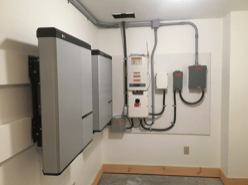
Another big factor that will influence your backup energy goals is how much you want to spend on batteries for your solar panel system. Unless you pay high demand charges, solar storage battery banks probably won’t save you any money (by high demand charges, we mean around $15 per kW—according to most research), but they will provide you with peace of mind.
The truth is that solar batteries are not cheap. What we consider to be a basic battery setup will cost anywhere from $21,000 to $46,000+. This will provide enough storage to power small, lightly used loads during an outage (for example, a well pump, 2 freezers, and (4) 13W light bulbs).
A more advanced system that has the potential for whole-home backup will cost over $85,000.
Keep in mind that the installation cost will increase if the batteries are not installed at the same time as your solar panel system. If you’re adding batteries to an existing system, you may need to purchase new inverters and other equipment on top of the battery itself.
You may be able to use the 30% Federal Solar Tax Incentive. Several states have additional tax incentives or grants for installing batteries.
Things to Consider When Calculating The Size of a Solar Battery System
Once you have identified the appliances and devices you want to power during outages and have an idea of the required budget for your solar battery system, it’s essential to delve into the technical aspects of accurately sizing your system. Factors such as the duration of backup power, rate of discharge, size of your backed-up appliances, and your solar system’s production all play a crucial role in determining the size of your battery system. By carefully considering these technical factors, you can ensure that your solar battery system meets your energy storage needs effectively and efficiently.
The Duration of Backup Power/Storage Capacity
First, how long would you like your batteries to provide power (this is known as your battery system’s storage capacity)? The longer you’d like your system to operate, the more batteries you will need.
Keep in mind how much space you have available to house the batteries. The more storage capacity you need and the more batteries you have, the larger the storage space will have to be. Depending on which type of battery you go with, they will either have to be stored inside or outside. If outside, they should be stored in a shaded and temperate area.
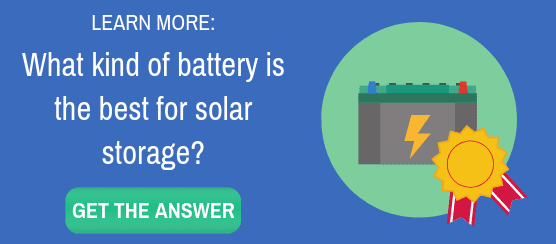
Rate of Discharge and Depth of Discharge
Another thing to note when determining the duration of your battery system is the rate of discharge or the amount of time it takes for your batteries to go from fully charged to their appropriate depth of discharge amount.
While it may seem unnecessary, it’s important not to use 100% of your batteries’ stored energy. Discharging your lead-acid batteries (and some lithium-ion batteries) down to 0% will shorten their lifespan. Depending on what the battery manufacturers advise, you may only be able to use 70% or 80% of your battery capacity.
The Size of Your Backed-Up Appliances/Battery Power
The next thing to consider is how many watts it takes to power what you’d like to back up. Think about how much instantaneous power it takes to run different applications and appliances. An emergency light may only take 60 watts, but a refrigerator may take 700 watts. This will play a significant part in estimating the battery bank size you need.
Your Solar System’s Production
Consider how many volts your PV panels are producing. Batteries charge when your solar system is generating more instantaneous power than you use at that moment. For a grid-tied system without battery backup, this power would go to the grid, and you would receive a credit or some other form of payment through net metering or another program. If you add a battery, your extra energy will charge up your battery, and any excess after that will pass to the grid.
If you rarely send solar-produced electricity back to the grid, you may have a hard time charging your batteries unless you add to your solar system or reduce your electric load. Another thing to keep in mind is your solar system’s seasonality. Your system likely produces much more electricity in the summer than in the winter.
However, certain battery setups have the availability to charge batteries using grid power as well, meaning your battery backup won’t just be dependent on what your solar system produces.
Battery Performance and Degradation
Degradation is an unavoidable part of any battery, from the ones in your smartphones to the ones that back up your home. Over time, the amount of energy your battery can store will slowly decrease. A battery may store 10 kWh of energy when it’s installed, but after 10 years, its storage capacity could be more like 7 kWh.
The good news is most battery manufacturers guarantee degradation rates, ensuring the battery doesn’t lose its capacity too quickly. Most warranties are between 10 and 12 years and guarantee that the system holds 70-80% of the original capacity. That breaks out to about 2% degradation each year.
How Long Do Solar Batteries Last?
Batteries won’t last forever and will eventually need to be replaced. Most manufacturers guarantee their batteries for 10 to 12 years. That said, the same manufacturers say most batteries could last 15 to 20 years, extending beyond their warranty period.
Maintenance for Solar Batteries
Most lithium-ion batteries are maintenance-free. There shouldn’t be any regular upkeep needed on the part of the owners. You’ll also have access to system monitoring which can help tee you off should something go wrong.
In short, adding batteries to your solar system shouldn’t add much in the way of additional complications or maintenance.
Home Battery Installation Tips
Where can you install your battery system, and do you have room for them? There are a few considerations you should make regarding where you locate your system.
Is Inside or Outside Better?
Your batteries can be installed inside or outside, though inside is often favored. If you opt for outdoor installation, ensure that your area’s climate falls within the manufacturers’ warranty temperature range, or else you could lose out on that protection. You’ll also need to store them out of direct sunlight. All in all, a garage or basement is best—an area where they’re out of the way and in a temperate environment.
How Much Space Will I Need?
One battery and inverter will take up about 6’x6′ of wall space. If you’re installing more than one battery, you’ll have to size up to accommodate. Some batteries can be installed on the floor to avoid using wall space
Recommended Battery Brands
There are three solar battery brands we currently recommend for energy storage: SolarEdge, Enphase, and Franklin Whole Home. They’ve earned their place on our list because they embody the following or are working towards it:
- They have proven track records in the industry.
- They offer flexible products that can scale up or down depending on what size system you want.
- Their products are competitively priced and offer great value.
- They integrate well with other systems, like EV chargers and load controls.
- They’re lithium-ion batteries that are more power dense, last longer, and require minimal maintenance.
- The manufacturers offer batteries, inverters, and interface units so everything integrates together seamlessly.
- They offer great warranties.
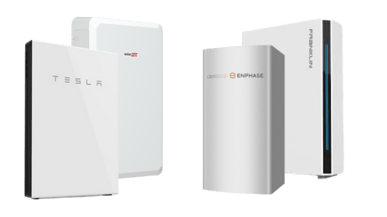
SolarEdge Home Battery Warranty:
- 10 years
- Unlimited cycles
- 70% of original capacity at end of warranty
Enphase IQ Battery Warranty:
- 10 years or 7,300 cycles
- 80% of original capacity at end of warranty
Franklin Whole Home:
- 12 years or 43 MWh (about 3,161 cycles)
- 70% of original capacity at end of warranty
Energy Storage Alternatives
While they are a great source of renewable energy backup, batteries aren’t for everyone. They’re not required to go solar, and there are other options.
Grid Backup
All grid-tied systems will be able to draw energy from the electric grid as long as the grid is working. In the event of a power outage, you will be without power. But you won’t have to invest any extra money in a storage system. If you live in an area with net metering, the grid will basically act as free energy storage, giving you a one-for-one trade for any electricity you upload to the grid.
Generator
While it is noisier and does require fuel, backup generators can be a great option for backup power. They’re less expensive than a battery-based energy backup system and will keep your essential roads running while the grid is down.
Frequently Asked Questions (FAQs)
Can I add batteries to my existing solar array later?
Yes, if your current inverter is hybrid or “battery-ready.” Otherwise you can add an AC-coupled unit that works alongside your grid-tied inverter. Expect an extra cost for the additional control hardware.
How many batteries do I need to power my home?
A typical U.S. home uses 25–30 kWh per day. Backing up critical loads (fridge, a few lights, Wi-Fi, well pump) usually needs 10 kWh. Whole-home backup for 24 hours often requires 20–30 kWh or two to three of today’s 10 kWh modules.
Lithium-ion vs. lead-acid: which is better for solar?
Lithium-ion (LFP/NMC): 90% depth-of-discharge, lighter, 6,000+ cycles, higher cost.
Lead-acid (AGM/FLA): 50% usable depth, heavier, 1,500–2,000 cycles, lower cost.
Most new installs choose lithium-ion for longevity and smaller footprint.
Will solar batteries run my home during an outage?
Lead-acid (AGM/FLA): 50% usable depth, heavier, 1,500–2,000 cycles, lower cost.
Will solar batteries run my home during an outage?
Yes, but only the circuits wired to the battery’s backup panel. Most homeowners back up critical loads to stretch runtime. Whole-home backup is possible but requires a larger (and pricier) battery bank.
What maintenance do solar batteries need?
Lithium batteries are virtually maintenance-free—just keep them between 32 °F and 113 °F. Lead-acid banks need periodic terminal checks, equalization charges, and water top-offs (if flooded).
What happens to excess solar power when my batteries are full?
In grid-tied systems, your inverter automatically exports surplus energy to the grid for net-metering credits once the battery reaches 100% state of charge.
